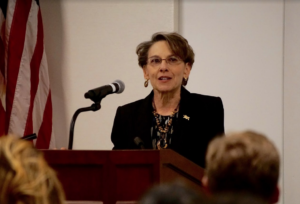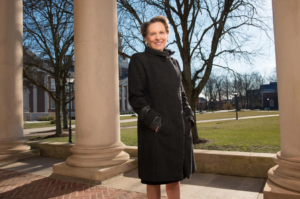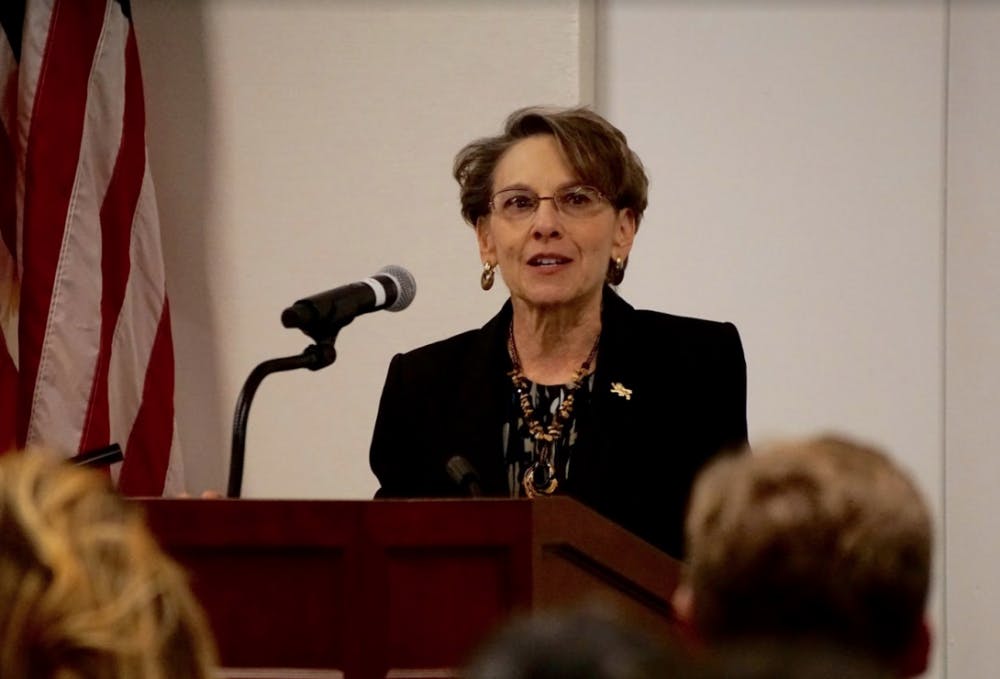By Michelle Lampariello
Managing Editor
The Board of Trustees announced its unanimous selection of the College’s new president-elect on Tuesday, March 27 — Kathryn Foster, an accomplished scholar and educator, will return to her home state to serve as the College’s 16th president on July 1.
Foster, a Verona, New Jersey native, is currently the president of the University of Maine at Farmington. Before her tenure at UMF began in 2012, Foster spent 18 years at the University at Buffalo, serving as the director of the school’s Regional Institute, chair of the Department of Urban and Regional planning and as the associate chair for undergraduate education and director of undergraduate studies.
While Foster is excited to return to her home state, and mentioned her affinity for New Jersey “at least three times in the cover letter,” she made it clear to the large crowd gathered in the Brower Student Center Room 225 East that the College’s location is not the only factor that drew her to the school.

“If all I wanted was to come back to New Jersey after many years away, I could’ve done that any time,” Foster said. “It took this opportunity at this magnificent institution to tug at me, to yank at me actually, to apply for the only position I have wanted or sought since assuming my current presidency in Maine.”
Foster cites the College’s reputation and values that align with her own as primary factors in her decision to apply for the position.
“TCNJ is eminent, it is accomplished, it is a place of academic excellence, it is a place where the values of the school resonate with me, about engagement, about inclusivity, about integrity, about self-reflection,” Foster said in an interview with The Signal.
Presidential Search Committee Chair Susanne Svizeny (’79) expressed her confidence in Foster’s leadership skills, and how Foster’s values, including the support of shared governance, played a large role in her success in the presidential search.
“We knew the charge was hard to find the right person that really could take TCNJ to that next level, and we believe and we are very confident in her capabilities,” Svizeny said.
Foster will remain UMF’s sitting president until her tenure at the College begins after current President R. Barbara Gitenstein retires on June 30. Foster explained that she does not want to infringe upon Gitenstein’s last few months in office, but plans to help make the transition as smooth as possible.
“We have talked about having some regular conversations to make sure that the pass of the baton, which sounds easy but it is really an event that requires some skill in athletics as well as in presidential transitions, that that pass of the baton is as smooth as it could be so that the school is continuing to advance, and we don’t lose any momentum and I am apprised of the issues that I need to be aware of,” Foster told The Signal.
The campus community is excited to see what Foster will do as president.
“She brings a tremendous amount of energy, and I think she will be a tremendous asset going forward to this institution,” said Jorge A. Caballero, chair of the Board. “I think it puts us on a path not only continuing the tremendous growth that President Gitenstein has done over the last 19 years, but also take us to the next level.”
Foster admires the impressive legacy Gitenstein leaves behind. She has studied some of Gitenstein’s initiatives and accomplishments during her tenure at the College to learn more about the school and how to effectively serve as its leader. She appreciates that Gitenstein strives for quality and excellence to give students the flair of a private school at a public institution, and that Gitenstein works to ensure that the College’s reputation matches reality.
As Foster grows more familiar with prominent campus issues, one sticks out to her — diversity and inclusion. Foster served in the U.S. Peace Corps from 1987 to 1989 in Swaziland, a landlocked African nation, before the end of Apartheid, and she believes this experience helped her to become a better and more understanding teacher, administrator and president.
“I experienced what it was like for two years to live as a young white woman in a nation where those things did not count for much, those were not categories if you will, categories of who you are that were important and that were respected,” Foster told The Signal. “It was an important learning experience for me and it was an important set of emotions and feelings to have about what is it like to be in a place where people make decisions about you, stereotype you, decide what you’re worth, essentially because of who you are and what you look like.”
Foster explained that while this is only her personal story, she feels that her experience in Swaziland has made her a proponent of “authentic inclusion,” and the idea that a diverse community is stronger than a homogenized one.

Students were happy to discover during Foster’s introductory speech to the campus community that she is an approachable leader with student-centered values.
“I’m excited to see what she does. She seems like someone who’s really relaxed and wants to hear what the students think and listen to our voices,” said Morgan Fligel, a junior finance major.
Gitenstein, who is well-liked by students and faculty members, will be missed by the campus community. However, students are hopeful that they will form a similarly fond relationship with Foster.
“I’m obviously going to miss the Git, but I’m looking forward to what (Foster) can bring to our campus in the future,” said Diana Da Silva, a freshman public health major.
Foster ended her address with an anecdote about her interview process for the job. She explained that after her flight was cancelled and her luggage went missing, she had no choice but to attend the final round of “speed dating” interviews with College constituents clad in a sweatshirt. She was embarrassed, and knew that “candidates who wear sweatshirts to the final interview typically do not get the job,” but decided to meet with Search Committee members, alumni, students, faculty, staff, union leaders, foundation leaders and Gitenstein regardless of her wardrobe.
“You do what you can, you do it in a sweatshirt, you call on some inner resilience and you show them that you can take a punch,” Foster said.
While the importance of resilience is certainly a lesson learned from Foster’s decision, she wanted to leave campus community members with a different message.
“The fact that I am standing here, that I got the job after all, says far less about me than it does about you,” Foster said. “Only a college with the confidence, character, kindheartedness and touch of craziness would look past the sweatshirt and intrust me with this astounding privilege and responsibility … I cannot think of a more honorable, meaningful or joyful way to spend the coming years of my life. Together we will do great things, and I cannot wait to get started. Thank you from the bottom of my heart, and go Lions!”







